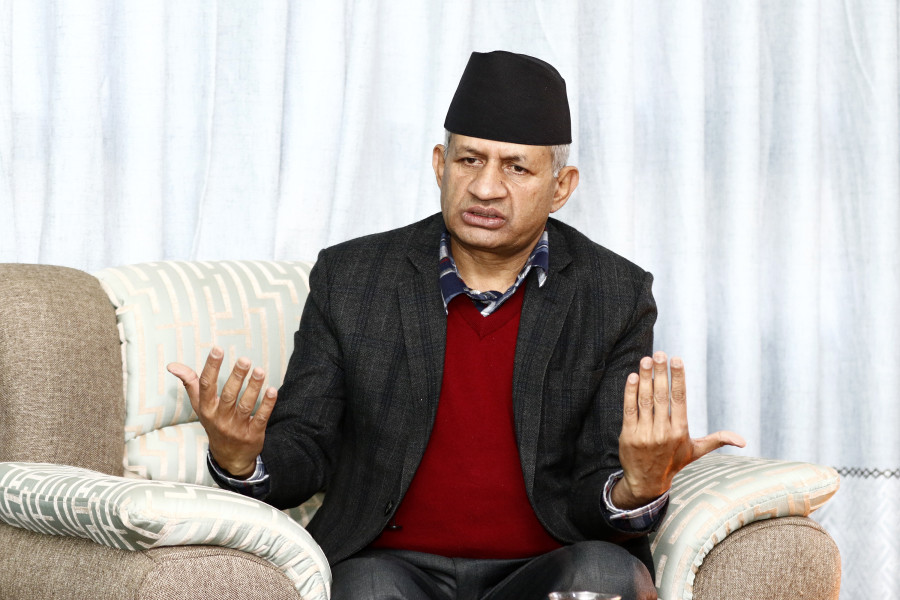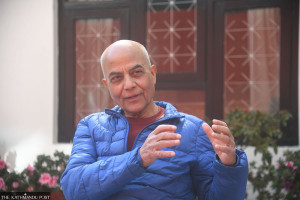Interviews
'Nepal conducts an independent foreign policy. But this does not mean we want to remain in isolation.'
Ahead of his trip to Geneva, the Post spoke with Gyawali about Nepal's future foreign policy strategy, relations with India, China and the United States, and the transitional justice process, among others.
Anil Giri & Sanjeev Satgainya
Pradeep Gyawali took the reins of the Ministry of Foreign Affairs after Nepal concluded its historical elections under the new constitution in November-December 2017. With a stable government, which recently completed its one year, after more than two and a half decades of political instability, Nepal is trying to redefine and consolidate its foreign policy vis-à-vis its immediate neighbours a well as the world, as it strives to achieve economic development. The Post's Sanjeev Satgainya and Anil Giri met with Gyawali on Saturday, hours before he flew to Switzerland to participate in the 40th session of the Human Rights Council, to talk about Nepal's future foreign policy strategy and its relations with India, China and the United States among other topics.
The following interview has been edited for grammar and clarity.
This government recently completed its one year in office. Can you, as a foreign minister, tell us how you want to take Nepal's foreign policy conduct forward in the coming years?
In the last one year we have reset—or rearranged for that matter—our foreign policy. While we will give continuity to our existing foreign policy, we will also strive to consolidate what we achieve on the way. Over the last year, our focus has been on putting Nepal's profile on the international radar screen as a progressive and democratic country. And also to make Nepal known in the international arena as a country that is striving to take a giant leap in terms of development. I believe we were successful in that regard to some extent—to generate the world's interest in Nepal and to foster international community's engagement with Nepal.
Second, while maintaining trustworthy ties with our neighbours, we also established and strengthened links beyond our neighbours. We also managed to make it more clear to our friends that our national interest will always remain at the centre. These will be stepping stones for us to take forward our foreign policy conduct in the coming days. I envision in the next one year—and in the coming years—Nepal will become a centre of attraction. I believe we will be able to promote Nepal as an attractive destination for investment.
Going by the focus you are putting on Nepal's foreign policy, it looks like the government is trying to effect diversification. What is it—a quest for strategic autonomy or is the government trying to go beyond the India-China mindset?
Our foreign policy focus has always been on maintaining good ties with neighbours while seeking to earn more and more friends. Nonetheless, there might have been certain interests—within the nation as well as among those who conducted the foreign policy then. But overall, we were in the right direction when it came to our international relations.
We lagged behind mainly due to the [political] transition, as a byproduct of which we inherited political instability. And the political instability entailed some policy inconsistencies, which invited unnecessary external interests. Due to this, sometimes the line got blurred between national interest and the interest of the government.
We are past that phase. For now, I have always reiterated four main dimensions of our relations. Neighborhood definitely matters, and we attach high importance to our neighbours. Then there are our development partners; without their support, we cannot embark on the path of economic development. They are our major source of official development assistance. They are also our major trade and investment partners. The third component is labour destinations where there are four to five million Nepalis. Relations with them are equally important.
As a sovereign nation, Nepal is capable of handling its internal affairs on its own. But this does not mean we want to stay in isolation. We need the goodwill of our friends, and we want to take them along. These all help strengthen our capacity to make our own independent, autonomous and sovereign decisions. At the heart of all these, I have kept our efforts to increase our economic capacities and economic development endeavours.
But to make a push for economic development, economic diplomacy works as a vehicle. Have we invested enough and have we sufficiently mobilized our resources to expand our economic diplomacy?
I think there are four components to this. First, we have to have our concept clear that our diplomatic conduct's major focus should be economic diplomacy. In the past, we might have prioritized goodwill-seeking for conflict management... or for constituting drafting. But we have shifted our focus now. There is conceptual clarity.
Second, we need to be clear what we want from which countries. For this, we are preparing country-specific profiles. We have completed profiles of 35 countries and will continue to expand that list. We will then decide what agenda we will be discussing with which country—the potential benefit we can get from that particular country, the status of trade with that particular country, what we are going to import from there and what we can export.
Third, we need to understand the legal frameworks of these countries. For this, the Foreign Ministry is working in coordination with the Finance Ministry and the Industry and Commerce Ministry. We are also working to formulate new legislations or amend existing laws to create an enabling environment for investment promotion. We are also trying to create some one-door service structures with a view to making the investment climate favourable.
Fourth is development of our human resources that can drive our all these efforts. But for that, our apparatus—I won't say they are strong. What I admit, however, is there is a gap between our expectations and the situation we are in.
Powerful countries are now showing more interest in Nepal. What strategy do you have up your sleeve to strike a fine balance, specifically when we are between two giant economies—India and China, and get the most for Nepal?
There is no doubt the world dynamics is changing fast. The existing world order is changing and a new world order is yet to take shape. As every other country is feeling the pressure, Nepal is also somewhere, somehow feeling that stress. But most importantly, what matters at the end of the day is: your intention and your fair conduct. We have been saying that our point of departure, or one of the major principles that will guide our foreign policy, is, "amity with all, enmity with none". Nor do we have any such global ambitions which often tend to trample on other countries' reasonable interest. There could be differences on certain issues. We often argue with developed countries when, for example, climate change issues are on the table, as we are paying for what we have not committed.
We also have strong arguments when it comes to trade relations. We are not in a position to have reciprocal relations with any country when it comes to trade relations. We tell [developed countries] we want preferential concessions, because somewhere, somehow we too have made contributions to their success.
We have also made it clear that we will not be part of any strategic alliances. We will never become part of any strategy that can hamper the interest of any of our friendly nations. Third, we want peaceful resolution to problems. And fourth, we maintain our conduct with every country independently. We don't view any country through another country's lens and we are sensitive about our friends' concerns while dealing with a particular country. That's why there is no need for anyone to doubt our independent, peaceful and cordial policy. Still, powerful countries have their agendas and they want to expand their influence and at times they want us to speak for their interest.
Let’s look at the case of Venezuela, or the Indo-Pacific strategy for that matter. As you are saying Nepal is not part of any alliance or strategy, that was not really reflected in these two cases?
I would like to make it clear that there is no confusion when it comes to the government's policy. But at times, some issues emerge from outside the government and their shadow is seen on the government. So we must be able to differentiate between what is government's policy and what is coming from outside the government.
America is our important and long-time development partner. As a matter of fact, Nepal opened up to the world only after we established our relationship with the United States. Over the years, America has continuously supported us in a wide range of sectors. We are grateful for that. My visit to the US in December and meeting with the Secretary of State, Mike Pompeo, helped take our 70-year-old Nepal-US ties to new heights, especially in the context that Nepal, after concluding its political transition, is trying to achieve economic development riding on the stability we have achieved. Whatever happened in between should not affect our efforts and plans to strengthen our relationship. We are very clear about this, and recent continuous dialogues have cleared all the suspicions and dilemmas, if there were any.
When it comes to India, Nepal appears to have sorted out some issues, while there are others still outstanding. There were some ups and downs in the recent past. Where do you think we are in terms of our bilateral relations? How do you plan to take our ties with India further?
You are right to say there were some ups and downs. We had to face an unprecedented—and unexpected—situation. I believe all of us have learned enough lessons from that. Regardless of what people say, Nepal and India have to work together as they strive to achieve their goals. This is a fact no one can deny. Some people say Nepal cannot move ahead without India and India can without Nepal. But I don't buy that argument. We are interdependent on a lot of issues even though India's scope of relations is vast and wide because of its sheer size. But for India, Nepal is equally important. We have to accept this fact.
Second, our multifaceted relationship brings challenges along with the opportunities. It is the political leadership's responsibility—and also a test of their acumen—how they mitigate the challenges. What I am happy about is efforts are being made from both sides at the political level to improve our political ties, something which we did not see in the last 15 to 20 years. What both sides have committed to now is: taking forward our trustworthy relations in the context of the 21st century. And in this, Nepal's larger interest will be securing economic partnership. Yes, India has its own interests. We have paid close attention to those, and we have been offering sufficient assurances as well.
The way we are moving ahead now, I believe that in the coming days, economic partnership will be at the heart of our relationship and it will benefit both the countries.
There were some concerns that India used to micromanage Nepal in the past.
Martin Luther King Jr once said: “… a man can't ride your back unless it is bent.” We should not blame others all the time. If that opportunity was given, then who created that opportunity? We are to blame. We were the ones who opened the door [for that]. But we have come a long way from that situation.
Let’s discuss our relations with China. Our level and layers of engagement with China have also exponentially increased. But it looks like we have not been able to extract as much benefit as we could have from China.
We have always had trouble-free and tension-free relations with China. But I sometimes wonder if we, the policymakers, took it for granted and limited our ties with our northern neighbor just to formality. We did not even bother to study what kind of dynamics was developing across the Himalayas and what kind of a role China was playing in the world economy. Even if we leave aside development partnership with China for a while, lifting 700 million people out of poverty in 40 years is no mean feat. It's a miracle when you look at the world's development landscape. We never tried to learn. Our delegations may have travelled to many countries to learn many things—federalism, constitution, development—but we never tried to learn from a country which is just across our Himalayas.
After some hesitation, we signed up to the Belt & Road Initiative in 2017. However, I must admit that we failed to pay the required attention to the preparation for selection of projects under that initiative. Now we are going to take that forward. We have discussed with China the projects that we want—and the ones that are feasible. We are holding discussions on the funding modality. BRI is a big economic concept. People are free to interpret it [the way they want], but for Nepal, it is an important project that can hugely contribute to our efforts to change our development landscape. And Nepal wants to be a part of it so that we can diversify our trade and transit, among others. We want to rise above one-sided dependency.
But there are still concerns about debt trap. We know we are not a big economy and we have our limitations. What is the government's perception?
I don’t think there is any confusion in Nepal about this. I believe this is an imported psychology. There have been some efforts to perpetuate this. If you see countries around the world since the 80s—China became a lender much later, many of them have gone bankrupt. Who should be blamed for that? There are so many lending agencies. There are multilateral donors and bilateral donors. What is important is how wise a concerned country is while selecting a project; whether there is national need or whether it is guided by someone’s personal interest. How skillfully the country presents itself during negotiations and [agreeing] terms and conditions, and how it plans to boost its production capacity while developing big infrastructure are equally important.
These three factors determine a lot of things, of which the Nepal government is well aware. That's why I believe this debt trap rumour in Nepal is aimed at instilling psychological fear. When we start discussions on the funding modality, we will extensively hold issue-wise deliberations. We will certainly be very cautious while taking loans.
One of the issues that the world is closely watching is Nepal's transitional justice process. What will be your message to the international community in Geneva about Nepal's efforts to conclude the process?
Definitely, the world is showing a huge interest in how Nepal is going to complete the remaining tasks of our peace process. We have time and again reiterated the fundamentals of our peace process. Nepal's peace process is home-grown and nationally led. For transitional justice, we formed two commissions which collected complaints from the victims. But because of some legal issues, they are yet to complete their tasks.
We have taken five components as the guiding principles for the conclusion of our peace process—the spirit of the Comprehensive Peace Agreement, international commitments Nepal has signed to, the Supreme Court's verdicts, victims' concerns and national context. The main objectives are healing the wounds inflicted by the conflict and erasing the divide it has created. This is the message I would like to convey to the international community. We have recently given an extension to the two transitional commissions and soon a bill to amend the Transitional Justice Act will be tabled in Parliament. We are also holding broader consultations with all the stakeholders with a view to completing the transitional justice process as soon as possible.
But the transitional justice process has been dragging on for more than a decade. There are complaints that the entire process has not been victim-centric and that the commissions' term extension was mere tokenism. Is there a lack of commitment or willingness on the part of political leadership?
There was no escape to term extension, as we could not have left this entire process in a vacuum. When we amend the Truth and Reconciliation Act in substance, I believe it will offer answers to most of your questions. Yes, initially there was some unwillingness or a lack of commitment. There was dilemma about how to go forward. There were also calls from some for adopting the "forget and forgive" formula. There was some fear also among some [leaders].
At times, many also believed that everything would be alright once the two parties of the conflict come to an agreement. But after a long discourse, there is unanimity among all the stakeholders on how we are going to take our transitional justice forward




 20.12°C Kathmandu
20.12°C Kathmandu





.jpg&w=200&height=120)








